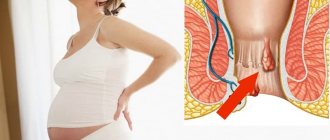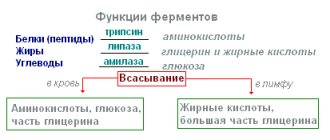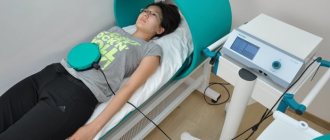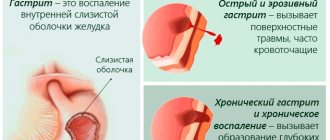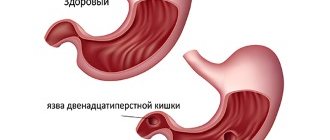Peptic ulcer of the stomach and duodenum
Nutrition for gastric and duodenal ulcers should be as gentle as possible. In addition to a limited diet, the patient must be limited in physical and emotional stress, and will also have to forget about smoking and drinking alcohol.
During an exacerbation of peptic ulcer disease, the diet should be as safe as possible in thermal and chemical terms, namely:
- You should not eat food whose temperature is below 15 and above 60 o C.
- Only liquid and puree foods can be consumed.
- You will have to give up all foods that increase the secretion of gastric juice (strong alcoholic and soft drinks, soda, fried foods, baked goods made from rye flour, etc.).
Treatment of duodenal and stomach ulcers with Donat Mg mineral water
Therapeutic mineral water Donat Mg normalizes acidity, peristalsis and blood circulation of the stomach, thereby protecting the mucous membrane from the aggressive effects of gastric juice and restoring motility of the entire gastrointestinal tract. Since Donat Mg mineral water contains magnesium ions, it is an effective liquid antacid that inhibits the secretion of gastric juice, “working” gently and carefully, without causing nausea or heartburn.
When treating stomach ulcers, mineral water should be taken in the morning on an empty stomach, 15-20 minutes before meals, 100-200 ml, preheated to a temperature of about 40 degrees. Donat Mg water should also be drunk during the day 15-20 minutes before meals and in the evening 20 minutes before dinner, both times in a volume of 150 ml, and the water temperature should be at room temperature.
What diet is required for stomach and duodenal ulcers?
As we said earlier in the article, the diet for stomach and duodenal ulcers should be as light as possible to ensure the consumption of foods that increase the symptoms of intestinal and gastrointestinal diseases.
Today, the requirements for products that can be consumed for peptic ulcer disease are less stringent than before, when there was little information about the characteristics of the disease. Now it’s no secret that one of the main reasons that increases the likelihood of exacerbation of the disease is a violation of the diet.
In 2000, 15 different tables were used to treat gastrointestinal diseases, each of which was used for a specific disease:
- Diets 1 to 5 were used for problems with the digestive system.
- Diet No. 6 was used for abnormal metabolic processes.
- Diet No. 7 was prescribed to patients who suffer from kidney problems, etc.
Today, a slightly modified system is used, which consists of 5 variations, within each of which all dietary tables are harmoniously distributed.
What mineral waters are good for the stomach and intestines?
Professor of the Department of Obstetrics and Gynecology of BelMAPO, Doctor of Medical Sciences Olga Peresada told the correspondent about which mineral waters are good for the stomach and intestines.
The effect of treatment with mineral waters depends not only on the correct choice of water, but also on the method of its administration and temperature. For example, the correct intake (for reduced gastric secretion - 10 - 20 minutes before meals, for increased secretion - an hour or two, for normal - 40 minutes) will provide the necessary therapeutic effect. In case of disorders of the patient’s cardiovascular system and water-salt metabolism, large quantities of mineral waters (as well as highly mineralized ones) are contraindicated.
Many mineral waters (for example, Borjomi, Jermuk, Narzan), due to their pleasant taste and ability to quench thirst, are widely used as table waters and are sold without restrictions in the retail chain. However, persons suffering from diseases of the gastrointestinal tract, cardiovascular and urinary systems, as well as metabolic disorders, should not use them without consulting a doctor.
To select the medicinal drinking water needed for a particular disease, you need to know what type it is. Typically the chemical composition is listed on the bottle label. The issue of prescription is decided by the doctor after a comprehensive examination of the patient and establishment of an accurate diagnosis.
For gastritis, characterized by low acidity of gastric juice, sodium chloride water is recommended. Mineral water should be taken shortly before meals in a heated form (30 - 40°C). You need to drink slowly, in small sips. These waters include “Minskaya”, “Nartan”, “Mirgorodskaya”.
Calcium chloride waters reduce the permeability of vascular walls and affect the blood coagulation system. They are also known as an expectorant. These waters are also prescribed for the treatment of the digestive system and nervous system. The springs of the Baltic countries are rich in chloride waters of mixed cationic composition with a predominance of sodium (salty): Druskininkai, Valmiera, Vytautas and Birute.
For hyperacid gastritis and peptic ulcer, which are accompanied by increased secretory function of the stomach, treatment with sodium bicarbonate waters is prescribed. The most famous among them is the water of the Borjomi spring with a concentration of 6 grams of salt per liter, as well as the Georgian alkaline waters “Nabeghlavi” and “Utsera”. Alkaline Caucasian springs “Dilijan”, “Achaluki” and Moldavian “Korneshtskaya”.
Hydrocarbonate-chloride sodium waters can be equally recommended for stomach diseases with both increased and decreased secretion. Among the representatives of such waters, the most famous are “Essentuki No. 4” and No. 17.
For the treatment of diseases of the liver, gallbladder and biliary tract, predominantly sulfate waters, which have a choleretic and laxative effect, are used. Waters of magnesium composition are particularly intense in this regard.
Hydrocarbonate-sulfate waters have a stimulating effect on bile formation and the functioning of the pancreas; they are used for gastritis with increased secretion and for peptic ulcers. The hydrocarbonate-sulfate-sodium waters “Makhachkala” and “Sernovodskaya” are chemically similar to the Karlovy Vary spring.
Chloride-sulfate waters are used for diseases of the stomach, mainly with insufficient secretion and acidity, with simultaneous damage to the liver and/or biliary tract.
A number of Pyatigorsk springs (Lermontovsky, Krasnoarmeysky, Teply Narzan) belong to chloride-hydrocarbonate-sulfate waters, but only sodium-calcium water “Mashuk No. 19” from this group is used for drinking purposes in bottles.
Ferrous waters are used in the treatment of hematopoietic organs. The highest iron content is in the Primorskaya, Darasun, and Narzan Elbrus springs. The Zheleznovodsk waters “Slavyanovskaya” and “Smirnovskaya” are widely known.
Low-mineralized waters successfully treat kidney and urinary tract diseases, as well as a number of liver diseases associated with the formation of stones, when highly mineralized waters are strictly contraindicated. The most famous is the Naftusya spring in the Truskavets resort.
Belarus also produces high-quality mineral water, different in the composition of microelements and balanced for daily use and the treatment of various diseases: “Lesnaya”, “Borovaya”, “Berezinskaya”, “Barkovshchinskaya”, “Darida”, “Vita”, “Pridvinskaya” , “Frost”, “Goretskaya”, “Starodorozhskaya”, “Minskaya”, “Rudnyanskaya”, “Narochanskaya” and others.
Mineral waters for peptic ulcers
Of course, ulcer patients need to drink mineral water, but there are some peculiarities: you need to know the best time to drink water, and also know what kind of water you can drink in a particular case. During remission, patients are recommended to use Borjomi, Essentuki No. 4, Slavyanovskaya, etc., which do not contain too many minerals. As a rule, doctors may prescribe drinking 150-200 ml of water three times a day.
Please note that mineral water can cause a negative reaction in the body. After 7-14 days from the moment of the first use of mineral water, the intensity of the pain syndrome may increase, and heartburn and belching may be bothersome. If the body reacts this way, you will have to reduce the dosage, or even stop drinking such water for a couple of days.
There may also be individual reactions, which may include frequent vomiting and nausea, diarrhea and other unpleasant symptoms, which require a visit to the doctor.
Conduct and course of treatment
The treatment regimen is individual for each patient.
The duration of therapy is individual and depends on the degree of damage to the stomach by ulcers and the course of the disease. You need to take warm water at the rate of 30 ml of liquid per 1 kg of the patient’s weight. It is divided into at least 6 doses and consumed on an empty stomach 15-20 minutes before meals after meals and during thirst. You can set up another schedule, which includes drinking 1 glass of water every hour. The treatment regimen is worked out by the doctor individually, based on the clinical picture, properties and chemical composition of the healing fluid.
Features of the diet at different stages of gastric ulcer
Of course, the permitted foods for stomach ulcers are very limited, but this does not mean that the patient will starve and lack vitamins. Today, nutritionists have developed dietary menus that allow you to eat a nutritious, varied and tasty diet. In order to treat gastric and duodenal ulcers as effectively as possible, it is necessary to adhere to 3 nutritional systems at different stages of disease progression (see table below).
| Table No. 1a | Table No. 16 | Table No. 1 | |
| When to use: | The first 10-12 days from the moment of exacerbation of peptic ulcer. | The next 10-12 days after an exacerbation of the disease. | After 21-25 days from the moment of exacerbation of the ulcer. |
| Authorized products: |
| At this stage, it is allowed to expand the daily menu with the following products.
|
Prohibited foods and treatment with folk remedies
As you can see, the list of permitted products is not too sparse, but restrictions on some products will still remain for such products as:
- Alcohol.
- Spices and seasonings.
- Hot sauces and dressings.
- Cibul and garlic without heat treatment.
- Raw radishes and turnips.
- Tomatoes.
- Cranberry.
- Strongly brewed coffee.
- Beans and other legumes.
Please note that the following products may be consumed, but only in limited quantities:
- Sorrel.
- Citrus fruits (in particular kiwi, oranges, lemons).
- Too fatty dairy products (ryazhenka, sour cream, cottage cheese).
The use of traditional methods, especially agave and propolis, is also of great benefit, but only after consultation with your doctor. Our ancestors began to use propolis for stomach and duodenal ulcers many centuries ago. This substance has proven itself in getting rid of inflammation of the stomach, and also helps eliminate scars on mucous surfaces.
Aloe for stomach ulcers is an equally effective folk remedy that has a wound-healing and antimicrobial effect, relieves pain, restores and heals damaged areas of the mucous membranes and skin. But note that folk remedies for stomach and duodenal ulcers are only good in combination with properly selected medication and diet therapy. Eat right and give up bad habits, because this is the key to a healthy intestines and stomach.a
Characteristics of mineral waters
Mineral waters are classified depending on the pharmacological activity of the ingredients. They are:
- canteens They are intended primarily for regular drinking over a long period of time. Water with mineralization up to 1 g/liter is considered table water. There are no biologically active substances in its composition. Any minerals have a cumulative effect, so the use of such liquid is limited to 1 liter per day;
- medicinal. The concentration of components with therapeutic effects in them exceeds 10 g/liter. The intake of such liquids must be strictly dosed, since they are equivalent to pharmacological drugs. Drinking water in small quantities will help get rid of pathologies of the stomach and intestines. Taking them in high doses will negatively affect the functioning of the digestive system.
Mineral water of natural origin is saturated with useful substances. It absorbs and accumulates them as it passes through the thickness of underground rocks. Water is extracted by drilling wells or brought to the surface from the bowels of the earth. Before going on sale, they undergo multi-stage purification to remove harmful impurities that are potentially hazardous to human health.
Recommendation! Mineral waters are sold both in grocery stores and pharmacies. In the latter, its quality is confirmed by the results of studies conducted in control and analytical laboratories. Therefore, it is necessary to purchase water for the treatment or prevention of gastrointestinal pathologies in pharmacies.
Possible reasons for restricting access:
Access is limited by court decision or on other grounds established by the legislation of the Russian Federation.
A network address that allows you to identify a site on the Internet is included in the Unified Register of domain names, page indexes of Internet sites and network addresses that allow you to identify sites on the Internet containing information the distribution of which is prohibited in the Russian Federation.
A network address that allows you to identify a site on the Internet is included in the Register of domain names, indexes of pages of sites on the Internet and network addresses that allow you to identify sites on the Internet containing information distributed in violation of exclusive rights.
